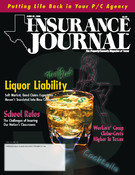“It’s nice work if you can get it,” goes the familiar saying. And nowhere does it apply better hant the liquor liability maket, where premiums are good and paid losses are about as low as they can get.
The challenge is persuading business owners to buy the coverage . The secret to doing it? Get out there and sell, sell, sell.
Liquor liability dates back to the days of prohibition and was one of the major issues of the 1932 presidential campaign. In fact, Franklin D. Roosevelt was elected president in part for his promise to “bring back beer.
Congress submitted to the states the 21st Amendment, thereby repealing the laws of prohibition enacted by the 18th Amendment. The required 36 states quickly ratified the amendment and Congress adopted it on Dec. 5, 1933.
Since then, states have been responsible for the oversight of the sale of liquor through dram shop laws, which take their name from the term dram, a measurement commonly used in the early sales of liquor. These laws are based on the idea of irresponsible alcohol service and provide a means for third parties to file suit for injuries and fatalities resulting from a liquor law violation.
Many states, including Texas, have enacted or reenacted dram shop legislation in response to concerns about the consequences of excessive consumption. Today, only a handful of states do not rely on dram shop laws to hold liquor sellers responsible for their sales.
Even with such legislation, few li-censed or permitted liquor distributors see a need for liquor liability insurance, raising the question: How can liquor liability insurers better market their wares?
“Liquor liability has been a really good risk, said Ken Horn, president of Austin Surplus Lines Agency in Austin. “We have not incurred a single loss in the last five years.
The problem is, while liquor liability is a really good risk, it is not a really good market. As Horn puts it, liquor liability is a “little-bitty teeny-tiny line of business despite the nearly 90,000 liquor permits and licenses issued in 1998 by the Texas Alcoholic Beverage Commission. That same year, less than $4.3 million in liquor liability premiums were written, according to figures from the Texas Department of Insurance, with earned premiums reaching almost $4.6 million. Paid losses that year were a mere $158,274.
The simple fact is liquor sellers do not face enough perceived risk to justify the expenditure for liquor liability insurance.
“It’s just too expensive for the insureds, said Roya Azari, a senior commercial property/casualty underwriter for Delta General Agency in Houston.
Delta writes liquor liability through Monticello, Scottsdale and Evanston, offering coverage on both a monoline and package basis. But since Texas does not require such coverage, a lot of sellers and distributors decide to simply cover potential loses themselves.
Over the last few years, a number of factors have combined to create a more favorable market for the sale of liquor liability insurance according to the Insurance Information Institute. Those factors include the increased responsibility assumed by owners and operators of eating and drinking establishments, stricter state liquor statutes, and the Risk Retention Act of 1986, which makes it easier to form risk retention groups that can provide insurance coverage outside the traditional market.
To top it off, the number of wrongful death cases decided against alcohol providers surged in the early 1990s.
The average judgment against alcohol providers had risen by 1990 to $500,000. Yet, liquor liability insurance sales in Texas have stagnated. According to Michael Lyttle, communications director with the Texas Restaurant Association, a 1999 internal survey of 300 restaurant locations showed only 45 percent carrying liquor liability insurance.
Some agents, like Lillian Braunstein of McQueary, Henry, Bowle & Troy of Dallas and a former board member of the Texas Restaurant Association, are overcoming that sentiment on a small scale, selling more liquor liability additions to restaurants, taverns and other liquor-selling establishments by simply checking their building lease.
A lot of landlords require liquor liability with specific limits, she said, and some insureds may not know it. Another way she increases her liquor liability coverages is through a thorough explanation of the risks of not carrying it and by networking through the Restaurant Association.
Braunstein writes a lot of business for Hull & Co. General Agency in Dallas, which underwrites all types of entertainment risk, including unsupported liquor liability according to Hull President Jack Huff.
Though she is continually trying to increase business, Braunstein does not do two things: she does not seek out nightclub business and she no longer writes policies without liquor liability coverage.
“I don’t really target nightclubs too much, she said. “They want to pay too little premium and they’re not worried about the substance of their policies…but I wouldn’t say anyone is particularly a better risk than anyone else.
Despite all her efforts, there are still some companies that Braunstein just can’t sell on the idea of liquor liability.
“I can tell you there are a lot of restaurants out there that don’t carry liquor liability, said Lillian Braunstein, “They’re willing to roll the dice on some things and liquor liability is one of them.
Topics Texas
Was this article valuable?
Here are more articles you may enjoy.


 Insurify Starts App With ChatGPT to Allow Consumers to Shop for Insurance
Insurify Starts App With ChatGPT to Allow Consumers to Shop for Insurance  Florida Engineers: Winds Under 110 mph Simply Do Not Damage Concrete Tiles
Florida Engineers: Winds Under 110 mph Simply Do Not Damage Concrete Tiles  Trump Demands $1 Billion From Harvard as Prolonged Standoff Appears to Deepen
Trump Demands $1 Billion From Harvard as Prolonged Standoff Appears to Deepen  ‘Structural Shift’ Occurring in California Surplus Lines
‘Structural Shift’ Occurring in California Surplus Lines 


